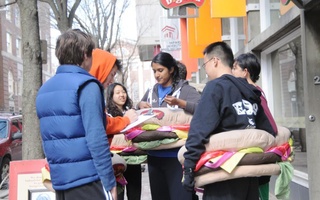After two years of revamping its virtual presence, the Institute of Politics will launch its latest social media initiative next week to better connect undergraduate members with students beyond the Institute.
Under the student-run “Digital Brigade” campaign, a group of Harvard undergraduates will use various social media outlets, including Twitter and Facebook, to publicize IOP events.
About 15 students have pledged to man the Digital Brigade, but IOP Student Communications Director Kathryn G. Walsh ’14, who is managing the group, hopes to soon double that number.
The Digital Brigade is the most recent of a series of social and digital media upgrades implemented by the IOP to modernize its mission of inspiring “undergraduates to consider careers in politics and public service.”
Improvements began two years ago when the IOP’s governing body—the Senior Advisory Committee, chaired by Caroline B. Kennedy ’80—requested an audit of the IOP’s internal operations.
The strategic audit revealed flaws in the IOP’s communications strategy that staff have since attempted to remedy, according to IOP Director of Communications and Marketing Esten Perez. When Walsh joined the IOP her freshman spring, for example, the Institute’s use of social media was largely under the radar.
“I couldn’t have told you if we had a Twitter,” she said.
Twitter now plays a noticeable role in IOP Forums, an improvement championed by Kellie A. Ryan, the IOP’s first social media coordinator.
Since Ryan joined the IOP in October, subscriptions to the IOP’s YouTube channel have more than tripled. Last month, Ryan also oversaw the launch of the IOP’s blog, which currently has 5,600 views.
The IOP is using its digital campaign as a mechanism for reaching out to students “beyond the IOP, beyond Harvard,” Ryan said.
Social media also gives more students access to the Institute, said IOP Director C. M. “Trey” Grayson ’94, calling the initiative “an attempt to address the reality that people have short attention spans.”
“People aren’t likely to sit at a computer for 90 minutes to watch a Forum,” Grayson said.
This realization inspired the “3 With IOP” series that now airs on YouTube. Each segment is three minutes long and poses three questions to IOP fellows and visitors.
“[Social media] amplifies the ability to share my expertise and my experiences with a broader group of students,” said current IOP Fellow Karen Hughes, a communications expert and one of former President George W. Bush’s top advisors.
The IOP plans to continue elevating the quality and quantity of its virtual presence, Perez said.
As the initiative moves forward, Walsh said that she hopes to see the IOP use online strategies to clarify its mission and program offerings for students.
—Staff writer Steven R. Watros can be reached at watros@college.harvard.edu. Follow him on Twitter @SteveWatros.
Read more in University News
Faust Travels to Capitol To Warn Against SequestrationRecommended Articles
-
 Elizabeth Warren Gets Her Own Music Video
Elizabeth Warren Gets Her Own Music Video -
 Ice Cream Trucks Compete To Raise Funds for Nonprofit
Ice Cream Trucks Compete To Raise Funds for Nonprofit -
 Burger Brigade Serves Free b. good Shakes Tomorrow
Burger Brigade Serves Free b. good Shakes Tomorrow -
Mind the SeamsCareer portals and dating sites flourish precisely because they work—not by replacing human intuition and pattern recognition, but by broadening our horizons and suggesting opportunities that might have been lost in the welter of our modern minds.
-
Ivy League Digital Network Launched Last WeekendThe new online network, which livestreams athletic contests from all eight Ivy League schools, premiered this past weekend with the showing of 23 live events.
-
The Internet is Yours, So Protect ItYou’ve grown up with the internet, developed alongside it, and stored a significant amount of your lives on it. And now you know that they, the NSA, are collecting your stuff, your information—not rightfully theirs, but rightfully yours.













